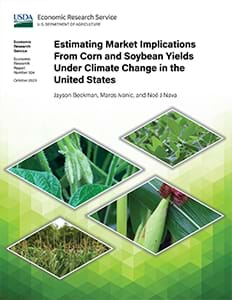Economic Research Report No. (ERR-324) 31 pp
Estimating Market Implications From Corn and Soybean Yields Under Climate Change in the United States
The United States is one of the largest producers and exporters of corn and soybeans globally partly because of yields that are among the highest in the world. However, a changing climate could affect these yields, which could ultimately affect production and the availability of products for export. In this report, the authors estimate that U.S. corn yields could increase 3.1 percent and soybean yields could decrease 3.0 percent in 2036 relative to 2016, based on climate projections. These results are driven primarily by the increased frequency of periods of extreme heat and declines in precipitation in counties east of the 100th meridian part of the United States. These estimates are then used in a simulation model to explore the market implications from these yield projections, and those results indicate that these yield changes could affect U.S. production and ultimately trade. The estimated growth in U.S. corn yields increases corn production that could ultimately affect the amount of corn the United States has available to export. Holding yields in other countries fixed, the model indicates that U.S. corn exports increase 0.36 percent (the equivalent of $63 million). The decline in soybean yields decreases production, leading to a 1.17-percent drop in U.S. exports (the equivalent of $319 million) based on 2016 exports.
How to Cite:
Beckman, J., Ivanic, M., & Nava, N.J. (2023). Estimating market implications from corn and soybean yields under climate change in the United States (Report No. ERR-324). U.S. Department of Agriculture, Economic Research Service. https://doi.org/10.32747/2023.8134358.ers
Keywords: Agricultural productivity, climate change, crop yields (bushels per acre), corn, soybeans, trade
In this publication...


